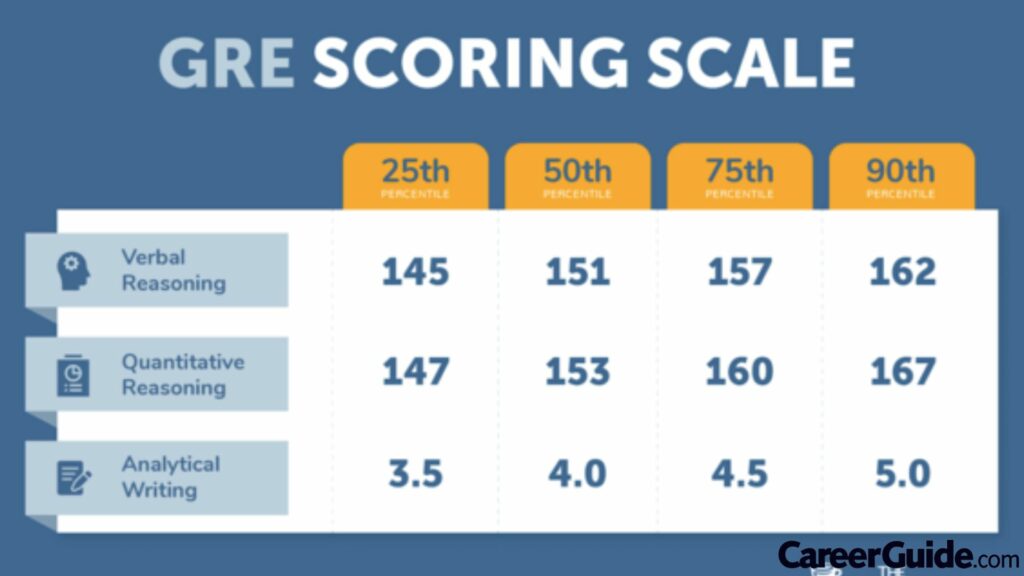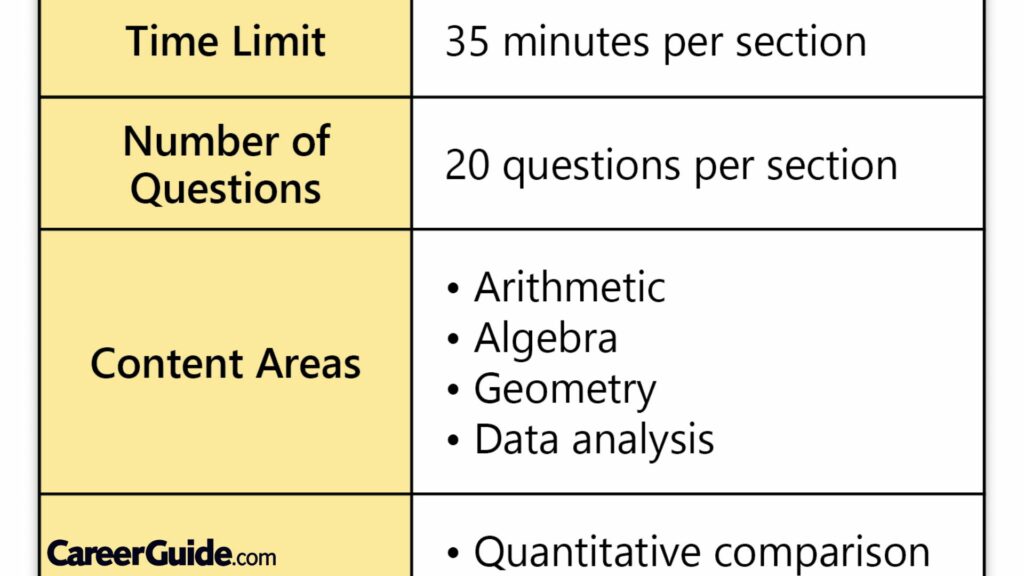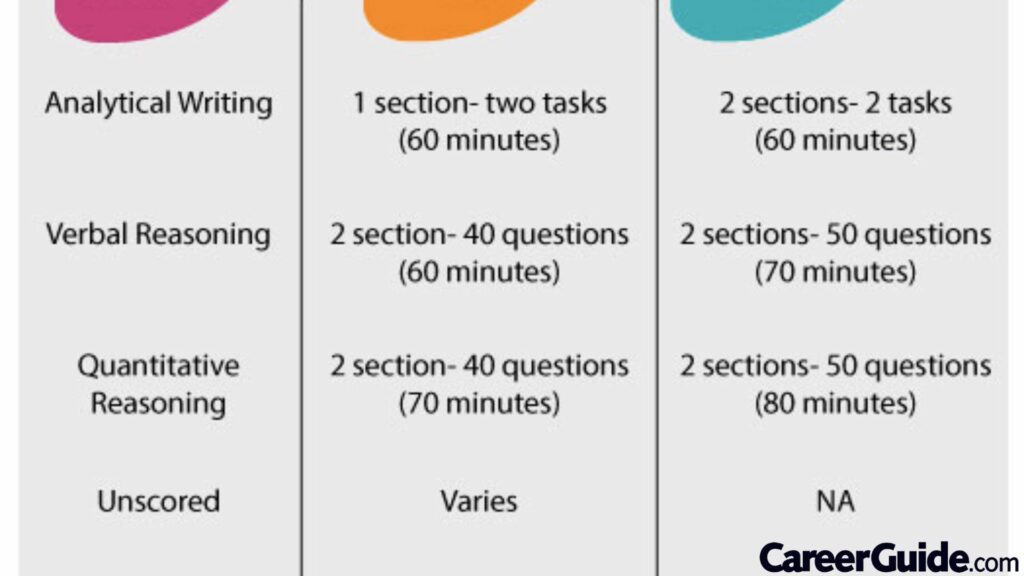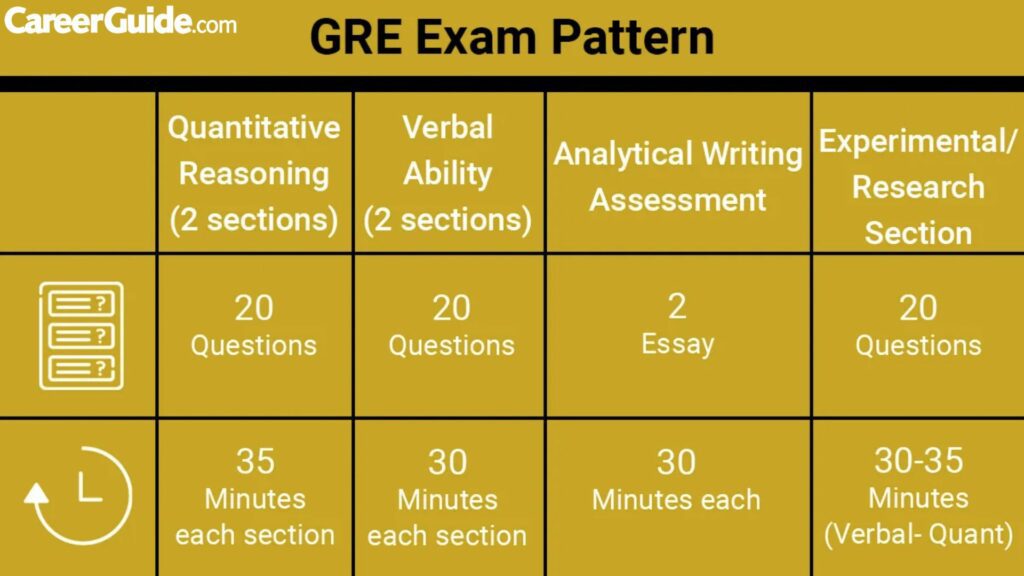GRE Exam Dates, Pattern, Syllabus And Cutoff
- GRE
-
Jan 21
- Share post
The Graduate Record Examinations (GRE) is a standardized test that is required for many graduate school programs in the United States, as well as in other countries. The test is intended to measure a candidate’s verbal reasoning, quantitative reasoning, and analytical writing abilities.
GRE Self Preparation

The Graduate Record Examination (GRE) is a standardized test that is required for admission to graduate programs in most universities in the United States. The test measures verbal reasoning, quantitative reasoning, and analytical writing skills. The test is divided into three sections: Verbal Reasoning, Quantitative Reasoning, and Analytical Writing.
Verbal Reasoning: This section tests your ability to understand and analyze written material. It includes questions on vocabulary, reading comprehension, and critical reasoning. To prepare for this section, you should read a wide variety of texts, including newspapers, magazines, and books. You should also work on building your vocabulary by using flashcards or vocabulary lists.
Quantitative Reasoning: This section tests your ability to understand and analyze quantitative information. It includes questions on arithmetic, algebra, geometry, and data analysis. To prepare for this section, you should review the concepts and formulas you learned in high school math classes. You should also practice solving math problems and become familiar with the format of the test.
Analytical Writing: This section tests your ability to analyze and communicate complex ideas. It includes two tasks: an “Analyze an Issue” task and an “Analyze an Argument” task. To prepare for this section, you should practice writing essays and become familiar with the structure of a good essay. You should also work on developing your critical thinking skills by analyzing various arguments and issues.
To prepare for the GRE, you should use a combination of self-study and practice tests. It is important to set a study schedule and stick to it. You should also take practice tests regularly to see where you need to improve. There are many resources available to help you prepare for the GRE, such as study guides, flashcards, and online tutorials. Some popular study guides are the Official Guide to the GRE and the Princeton Review GRE.
In addition to studying, you should also take care of your physical and mental well-being. Get enough sleep, eat a healthy diet, and exercise regularly to keep your energy levels up. It is also important to manage your stress levels, as stress can negatively affect your performance on the test.
In summary, the GRE is a challenging test that requires a combination of self-study and practice tests to prepare. To do well on the test, you should focus on building your vocabulary, reviewing math concepts, and developing your critical thinking skills. Additionally, it is important to take care of your physical and mental well-being and manage your stress levels. With a good study plan and the right resources, you can do well on the GRE and achieve your goal of getting into graduate school.
<h2 id=What is a good score on the GRE?

A good score on the GRE varies depending on the graduate program and the institution you are applying to. However, a score of around 150-160 on the verbal and quantitative sections and a 4.0 on the analytical writing section is considered competitive for many programs.
How often is the GRE offered?
The GRE is offered year-round at computer-based test centers. You can typicaly take the test once every 21 days, up to five times within any continuous rolling 12-month period.
How do I register for the GRE?
You can register for the GRE online at the Educational Testing Service (ETS) website. You will need to create an account, select a test date and location, and pay the registration fee. You can also register by mail or phone.
How much does it cost to take the GRE?
The cost to take the GRE varies depending on the location and the test center. The standard registration fee for the GRE is $205, but this may vary depending on your location. You can also pay additional fees for things like rescheduling, changing your test center, or requesting scores to be sent to additional schools.
How long does it take to get your GRE scores?
It typically takes about 10-15 days for your GRE scores to be available online. You will receive an email notification when your scores are available, and you can view them online by logging into your ETS account.
Can I retake the GRE if I am not satisfied with my scores?
Yes, you can etake the GRE if you are not satisfied with your scores. However, you will need to wait at least 21 days between test attempts, and you can only take the test five times within any continuous rolling 12-month period.
What are the most important tips for preparing for the GRE?
The most important tips for preparing for the GRE include reviewing math concepts, practicing math problems, practicing mental math, taking practice tests, analyzing your mistakes, using high-quality and updated materials, managing your time, and building your vocabulary.
Are there any accommodations available for students with disabilities on the GRE?
Yes, students with disabilities may be eligible for accommodations on the GRE test. This includes things like extra breaks, a quiet testing room, assistive technology, extended time, large print or Braille test materials, audio assistance, and scribe or reader assistance. You will need to provide documentation of your disability and request accommodations in advance.
This is not an exhaustive list of questions and answers, but a good starting point to understand more about the GRE. It is always recommended to check the official website of the ETS and reach out to them for more information.
GRE Prep Books

Preparing for the Graduate Record Examination (GRE) can be a challenging task, but with the right study materials, you can improve your chances of doing well on the test. One of the most effective ways to prepare for the GRE is to use prep books. These books are designed to provide comprehensive review of the test material and to help you develop effective test-taking strategies. Here are some of the best GRE prep books that are currently available:The Official Guide to the GRE General Test: This book is published by the Educational Testing Service (ETS), which is the organization that administers the GRE. It includes real GRE test questions, along with answer explanations, and test-taking strategies. Additionally, the book includes a math review and a verbal reasoning review. This is considered a must-have for anyone preparing for the GRE.
Kaplan GRE Premier 2020: This book is published by Kaplan and it includes a comprehensive review of all the test material, along with practice questions and detailed answer explanations. Additionally, the book includes online resources such as practice tests, video lessons, and a math review.
Cracking the GRE: This book is published by The Princeton Review and it includes a comprehensive review of all the test material, along with practice questions and detailed answer explanations. Additionally, the book includes online resources such as practice tests, video lessons, and a math review.
Manhattan Prep GRE Set of 8 Strategy Guides: This set of books is published by Manhattan Prep and it includes guides for each section of the test, along with practice questions and detailed answer explanations. Additionally, the books include test-taking strategies, tips, and a math review.
Barron’s GRE: This book is published by Barron’s and it includes a comprehensive review of all the test material, along with practice questions and detailed answer explanations. Additionally, the book includes online resources such as practice tests, video lessons, and a math review.GRE Vocabulary Flashcards: This set of flashcards is published by Magoosh and it includes over 1,200 of the most important vocabulary words that are likely to appear on the GRE test. Additionally, the cards come with an app that allows you to practice and track your progress.
When choosing a GRE prep book, it’s important to consider your own learning style, and choose a book that aligns with your needs. Additionally, it’s important to use high-quality and updated materials that are specifically designed for
GRE Prep Tips for Subjects
GRE Analytical Writing Preparation Tips

The Analytical Writing section of the Graduate Record Examination (GRE) tests your ability to analyze and communicate complex ideas. It includes two tasks: an “Analyze an Issue” task and an “Analyze an Argument” task. To do well on this section, it is important to have a good understanding of the format of the tasks, to practice writing essays and to develop effective test-taking strategies. Here are some tips for preparing for the Analytical Writing section of the GRE:
Understand the format of the tasks: The “Analyze an Issue” task requires you to take a position on an issue and to provide reasons and examples to support your position. The “Analyze an Argument” task requires you to evaluate an argument and to identify any flaws in the reasoning. It’s important to understand the format of each task and to follow the instructions carefully.
Practice writing essays: To prepare for the Analytical Writing section, practice writing essays and become familiar with the structure of a good essay. This includes a clear introduction, well-organized body paragraphs, and a strong conclusion. Practice writing on different topics and in different formats.
Develop critical thinking skills: The Analytical Writing section also tests your ability to analyze and communicate complex ideas. To prepare, practice analyzing various arguments and issues, and work on developing your critical thinking skills.
Learn the format of the task: Each task requires a different format and structure. Make sure to understand the instructions and format of each task before you start writing.
Use high-quality and updated materials: Make sure to use
Preparing for the Graduate Record Examination (GRE) can be a daunting task, especially if you are trying to brush up on specific subjects. However, with the right approach and resources, you can improve your chances of doing well on the test. Here are some tips for preparing for specific subjects on the GRE:
Mathematics: To prepare for the mathematics section of the GRE, review the concepts and formulas you learned in high school math classes. This includes arithmetic, algebra, geometry, and data analysis. Practice solving problems using the formulas and concepts, and become familiar with the format of the test. Additionally, practice mental math, as calculators are not allowed on the GRE.
Verbal Reasoning: To prepare for the verbal reasoning section of the GRE, build your vocabulary by learning commonly-tested words and then moving on to more advanced vocabulary. Practice reading comprehension by reading a wide variety of texts, including newspapers, magazines, and books. Additionally, develop your critical thinking skills by analyzing arguments and identifying flaws in reasoning.
Analytical Writing: To prepare for the analytical writing section of the GRE, practice writing essays and become familiar with the structure of a good essay. This includes a clear introduction, well-organized body paragraphs, and a strong conclusion. Additionally, practice analyzing various arguments and issues, and work on developing your critical thinking skills.
Biology: To prepare for the biology section of the GRE, review the concepts and facts you learned in high school and college biology classes. This includes cell biology, genetics, evolution, ecology, and physiology. Practice solving problems and answering questions related to these concepts and facts.
Chemistry: To prepare for the chemistry section of the GRE, review the concepts and facts you learned in high school and college chemistry classes. This includes atomic structure, chemical reactions, thermodynamics, and kinetics. Practice solving problems and answering questions related to these concepts and facts.
Physics: To prepare for the physics section of the GRE, review the concepts and facts you learned in high school and college physics classes. This includes mechanics, thermodynamics, electromagnetism, and optics. Practice solving problems and answering questions related to these concepts and facts.
English Literature: To prepare for the English Literature section of the GRE, review the literary works and authors you studied in high school and college. Practice analyzing texts and identifying literary elements such as plot, character, setting, and theme. Additionally, practice writing literary analysis essays, and develop your critical thinking skills.
GRE Quant Preparation Tips

The Quantitative Reasoning section of the Graduate Record Examination (GRE) tests your ability to understand and analyze quantitative information. It includes questions on arithmetic, algebra, geometry, and data analysis. To do well on this section, it is important to have a solid understanding of the material and to develop effective test-taking strategies. Here are some tips for preparing for the Quantitative Reasoning section of the GRE:
Review math concepts: To prepare for the Quantitative Reasoning section, you should review the concepts and formulas you learned in high school math classes. This includes arithmetic, algebra, geometry, and data analysis. Make sure you understand the concepts thoroughly, and practice solving problems using the formulas and concepts.
Practice math problems: The Quantitative Reasoning section includes both multiple-choice and quantitative comparison questions. To prepare, practice solving math problems and become familiar with the format of the test. This will help you to become more comfortable with the types of problems you will encounter on the test and to develop effective strategies for answering them.
Learn math formulas: The Quantitative Reasoning section also includes questions on data analysis. To prepare, learn math formulas and concepts that are commonly tested such as mean, median, standard deviation, and probability.
Practice mental math: The GRE does not allow the use of calculators, so it’s important to practice mental math. This will help you to solve problems quickly and accurately, and to manage your time effectively.
Take practice tests: One of the most effective ways to prepare for the Quantitative Reasoning section is to take practice tests. Practice tests can help you become familiar with the format of the test, identify areas where you need to improve, and track your progress.
Analyze your mistakes: After taking practice tests, review the questions that you got wrong and analyze your mistakes. Identify what you did wrong and what you can do to improve. This will help you to focus your studying and to avoid making the same mistakes on the actual test.
Use high-quality and updated materials: Make sure to use materials that are specifically designed for the GRE and that have been recently updated to reflect the current format of the test. This will help you to get a better sense of what to expect on the test and to prepare more effectively.
Manage your time: The GRE is a timed test, so it is important to manage your time effectively. Practice taking the test under timed conditions and develop strategies for answering questions efficiently.
In summary, preparing for the Quantitative Reasoning section of the GRE requires a solid understanding of the material and effective test-taking strategies. To do well on this section, you should review math concepts, practice math problems, learn math formulas, practice mental math, take practice tests, analyze your mistakes, use high-quality and updated materials, and manage your time. By following these tips, you can improve your chances of doing well on the Quantitative Reasoning section of the GRE.
GRE Prep Tips Section Wise

The Graduate Record Examination (GRE) is a standardized test that measures verbal reasoning, quantitative reasoning, and analytical writing skills. To do well on the test, it is important to have a solid understanding of the material and to develop effective test-taking strategies. Here are some tips for each section of the GRE:
Verbal Reasoning:
Build your vocabulary: A strong vocabulary is essential for doing well on the verbal reasoning section of the GRE. Start by learning commonly-tested words and then move on to more advanced vocabulary. Use flashcards or online vocabulary lists to practice.
Practice reading comprehension: The verbal reasoning section includes questions on reading comprehension. To prepare, practice reading a wide variety of texts, including newspapers, magazines, and books. Try to understand the main idea and the author’s purpose.
Develop critical thinking skills: The verbal reasoning section also includes questions on critical reasoning. To prepare, practice analyzing arguments and identifying flaws in reasoning.
Quantitative Reasoning:
Review math concepts: The quantitative reasoning section includes questions on arithmetic, algebra, geometry, and data analysis. To prepare, review the concepts and formulas you learned in high school math classes.
Practice math problems: The quantitative reasoning section includes both multiple choice and quantitative comparison questions. To prepare, practice solving math problems and become familiar with the format of the test.
Learn math formulas: The quantitative reasoning section also includes questions on data analysis. To prepare, learn math formulas and concepts that are commonly tested.
Analytical Writing:
Practice writing essays: The analytical writing section includes two tasks: an “Analyze an Issue” task and an “Analyze an Argument” task. To prepare, practice writing essays and become familiar with the structure of a good essay.
Develop critical thinking skills: The analytical writing section also tests your ability to analyze and communicate complex ideas. To prepare, work on developing your critical thinking skills by analyzing various arguments and issues.
Learn the format of the task: Each task requires a different format and structure. Make sure to understand the instructions and format of each task before you start writing.
General Tips:
Take practice tests: One of the most effective ways to prepare for the GRE is to take practice tests. Practice tests can help you become familiar with the format of the test, identify areas where you need to improve, and track your progress.
Manage your time: The GRE is a timed test, so it is important to manage your time effectively. Practice taking the test under timed conditions and develop strategies for answering questions efficiently.
Relax and take care of yourself: The GRE can be stressful, so it is important to take care of your physical and mental well-being. Get enough sleep, eat a healthy diet, and exercise regularly.
Use high-quality and updated materials: Make sure to use materials that are specifically designed for the GRE and that have been recently updated to reflect the current format of the test.
Learn from your mistakes: After taking practice tests, review the questions that you got wrong and analyze your mistakes. Identify what you did wrong and what you can do to improve.
In summary, preparing for the GRE requires a combination of understanding the material and developing effective test-taking strategies. To do well on the test, it is important to build your vocabulary, practice reading comprehension and math problems, develop critical thinking skills, take practice tests, manage your time, take care of yourself, and learn from your mistakes. By following these tips, you can improve your chances of doing well on the GRE and achieving your goal of getting into graduate school
When to Start GRE Prep?

When to start preparing for the Graduate Record Examination (GRE) depends on several factors, including your current level of readiness, your test date, and your study schedule. It is important to begin preparing early enough to give yourself enough time to study and practice, but not so early that you burn out or lose focus.
If you have a test date that is several months away, it is a good idea to start preparing as soon as possible. Starting early will give you enough time to review the material, take practice tests, and identify areas where you need to improve. It will also allow you to spread out your studying over time, which can help to reduce stress and prevent burnout.
If you have a test date that is less than three months away, it is important to begin preparing immediately. At this point, you will need to focus your studying and practice on the areas where you need the most improvement. You should also take several practice tests to get a sense of what the test will be like and to identify areas where you need to focus your studying.
If you are not sure when you want to take the GRE, you can start preparing at any time. However, it is important to set a test date and create a study schedule to help you stay on track. You should also take practice tests regularly to monitor your progress and identify areas where you need to improve.
Regardless of when you decide to start preparing for the GRE, it is important to create a study schedule that works for you. This schedule should include time for studying and practice, as well as time for rest and relaxation. You should also make sure to take care of your physical and mental well-being by getting enough sleep, eating a healthy diet, and exercising regularly.
It is also important to use high-quality and updated materials when preparing for the GRE. There are many resources available, including study guides, practice tests, flashcards, and online tutorials. Make sure to use materials that are specifically designed for the GRE and that have been recently updated to reflect the current format of the test.
In summary, when to start preparing for the GRE depends on your test date and your current level of readiness. Starting early will give you enough time to review the material, take practice tests, and identify areas where you need to improve. It’s important to set a study schedule that works for you, take care of your physical and mental well-being, use high-quality and updated materials, and monitor your progress regularly. This way you can improve your chances of doing well on the test.
GRE Online Prep

Preparing for the Graduate Record Examination (GRE) can be a daunting task, but with the right resources and approach, it is possible to do well on the test. One of the most convenient and efficient ways to prepare for the GRE is through online preparation.
Online GRE preparation offers many advantages over traditional in-person preparation. One of the main benefits is the flexibility to study at your own pace and schedule. You can access the materials and resources at any time, from anywhere, and on any device. This makes it easy to fit studying into a busy schedule.
Another advantage of online GRE preparation is the variety of resources available. There are many websites and apps that offer GRE preparation materials, such as practice tests, flashcards, and tutorials. Some popular websites for GRE preparation include Khan Academy, Kaplan, and Manhattan Prep. These websites offer a wide range of materials, including video lessons, practice questions, and full-length practice tests.
Online GRE preparation also offers a wide range of practice tests, which are an essential part of preparing for the test. Practice tests help you become familiar with the format of the test, identify areas where you need to improve, and track your progress. Many online GRE preparation websites offer full-length practice tests, which simulate the actual test experience.
Online GRE preparation also offers interactive resources such as live online classes and virtual tutoring. Live online classes provide a structured study plan and allow you to interact with other students and a teacher. Virtual tutoring gives you the opportunity to receive personalized feedback and guidance on your performance.
In addition to the resources provided by online GRE preparation websites, there are also many free resources available online. Websites such as Khan Academy and Magoosh offer free video lessons and practice questions. Additionally, you can find GRE vocabulary lists, math formulas, and other study materials on various websites for free.
One important aspect of online GRE preparation is to make sure that you are using high-quality and updated materials. There are many websites and apps that claim to offer GRE preparation materials, but not all of them are created equal. Make sure to check the reviews and ratings of the resources you are using before you start studying.
In summary, online GRE preparation is a convenient and efficient way to prepare for the test. It offers flexibility, a wide range of resources, and the ability to track your progress. By using high-quality and updated materials, taking practice tests, and making use of interactive resources such as live online classes and virtual tutoring, you can improve your chances of doing well on the test.
In-Person Preparation
Preparing for the Graduate Record Examination (GRE) in-person can be a great way to boost your test-taking skills, focus your studying and make sure you cover all of the material. This type of preparation allows you to attend classes, interact with instructors and other students, and take practice tests in a traditional classroom setting.
One of the main benefits of in-person GRE preparation is the opportunity to attend classes with a qualified instructor. The instructor can provide guidance on the test format, strategies for answering questions, and tips for managing time during the test. They can also answer questions, provide feedback on practice tests, and provide personalized instruction to address areas where you may be struggling.
Another benefit of in-person GRE preparation is the ability to interact with other students. You can learn from their questions, experience, and study habits. This can help you to stay motivated and on track with your studying. Additionally, you will have the opportunity to form study groups with other students and to practice working together on problems and essay tasks.
In-person GRE preparation programs also typically provide access to a wide range of resources, such as study guides, practice tests, and flashcards. These resources can be very helpful in supplementing your studying and practice. Many programs also offer additional resources such as online practice tests and video lessons.
In-person GRE preparation also offers the opportunity to take practice tests under realistic conditions. Many programs offer practice tests that simulate the actual test-taking experience. This can help you to become more familiar with the test format and to develop strategies for answering questions under time pressure.
Additionally, in-person GRE preparation programs also offer a structured study plan that can help you to focus your studying and make the most of your time. The program will provide a schedule of classes, practice tests, and other activities that are designed to help you to prepare for the test in the most effective way possible.
However, one of the main disadvantages of in-person preparation is that it can be less flexible. In-person classes usually have set schedules that may not align with your own schedule. Additionally, you may have to travel to attend the classes, which can be time-consuming and costly.
In conclusion, preparing for the GRE in-person can be a great way to boost your test-taking skills, focus your studying and make sure you cover all of the material. In-person preparation offers the opportunity to attend classes with a qualified instructor, interact with other students, access to a wide range of resources, take practice tests under realistic conditions, and benefit from a structured study plan. However, it may not be as flexible as online preparation. So, it’s important to weigh the pros and cons and choose the method that best fits your learning style and schedule.
GRE Self Preparation

The Graduate Record Examination (GRE) is a standardized test that is required for admission to graduate programs in most universities in the United States. The test measures verbal reasoning, quantitative reasoning, and analytical writing skills. The test is divided into three sections: Verbal Reasoning, Quantitative Reasoning, and Analytical Writing.
Verbal Reasoning: This section tests your ability to understand and analyze written material. It includes questions on vocabulary, reading comprehension, and critical reasoning. To prepare for this section, you should read a wide variety of texts, including newspapers, magazines, and books. You should also work on building your vocabulary by using flashcards or vocabulary lists.
Quantitative Reasoning: This section tests your ability to understand and analyze quantitative information. It includes questions on arithmetic, algebra, geometry, and data analysis. To prepare for this section, you should review the concepts and formulas you learned in high school math classes. You should also practice solving math problems and become familiar with the format of the test.
Analytical Writing: This section tests your ability to analyze and communicate complex ideas. It includes two tasks: an “Analyze an Issue” task and an “Analyze an Argument” task. To prepare for this section, you should practice writing essays and become familiar with the structure of a good essay. You should also work on developing your critical thinking skills by analyzing various arguments and issues.
To prepare for the GRE, you should use a combination of self-study and practice tests. It is important to set a study schedule and stick to it. You should also take practice tests regularly to see where you need to improve. There are many resources available to help you prepare for the GRE, such as study guides, flashcards, and online tutorials. Some popular study guides are the Official Guide to the GRE and the Princeton Review GRE.
In addition to studying, you should also take care of your physical and mental well-being. Get enough sleep, eat a healthy diet, and exercise regularly to keep your energy levels up. It is also important to manage your stress levels, as stress can negatively affect your performance on the test.
In summary, the GRE is a challenging test that requires a combination of self-study and practice tests to prepare. To do well on the test, you should focus on building your vocabulary, reviewing math concepts, and developing your critical thinking skills. Additionally, it is important to take care of your physical and mental well-being and manage your stress levels. With a good study plan and the right resources, you can do well on the GRE and achieve your goal of getting into graduate school.
What is the Right Time for GRE Test Prep?
The right time to start preparing for the Graduate Record Examination (GRE) depends on several factors, including an individual’s academic background, the amount of time they have until their desired test date, and their personal study habits.
For individuals who have recently graduated from college or are currently in the final stages of their undergraduate studies, it may be beneficial to start preparing for the GRE as soon as possible. This will allow them to take advantage of the knowledge and skills they have gained during their undergraduate studies, while also providing enough time to master the material on the test.
For those who have been out of school for an extended period of time, it may be necessary to start preparing for the GRE several months in advance. This will allow them to refresh their knowledge and skills, and provide enough time to master the material on the test.
In general, it is recommended that individuals begin preparing for the GRE at least three to six months before their desired test date. This will provide enough time to master the material on the test and become comfortable with the test-taking format.
However, it’s also important to consider one’s personal study habits when determining the right time to start preparing for the GRE. Some individuals may require more time to prepare, while others may be able to prepare more quickly. It’s essential to take into account one’s own learning style and schedule.
It’s also essential to make sure that you take multiple practice tests before taking the actual GRE to get a sense of how much time you require to prepare. If you find that you are struggling with the material or are not meeting your desired scores on practice tests, it may be necessary to start preparing for the GRE earlier.
In summary, the right time to start preparing for the GRE depends on several factors, including an individual’s academic background, the amount of time they have until their desired test date, and their personal study habits. It’s recommended to start preparing at least three to six months before the desired test date and take into account one’s own learning style and schedule.
Read Also:
MBA Exams
Top Searches
Jee Mains
Jee Advance
STUDENTS
- For 9th class
- Skill Based Career Test |
- Services |
- Basic Plan |
- Advance Plan |
- Video Counselling Plan |
- Mentorship Plan
- For 10th class
- Stream Selector Test |
- Ideal Career Test |
- Services |
- Basic Plan |
- Advance Plan |
- Video Counselling Plan |
- Mentorship Plan
- For 11th class
- Ideal Career Test |
- Engineering Branch Selector |
- Humanities Career Selector |
- Commerce Career Selector |
- Services |
- Basic Plan |
- Advance Plan |
- Video Counselling Plan|
- Mentorship Plan
- For 12th class
- Ideal Career Test |
- Engineering Branch Selector |
- Humanities Career Selector |
- Commerce Career Selector |
- Services |
- Basic Plan |
- Advance Plan |
- Video Counselling Plan |
- Mentorship Plan
- For B.Com
- Commerce Career Selector |
- Ideal Career Test |
- Services |
- Basic Plan |
- Advance Plan |
- Video Counselling Plan |
- Mentorship Plan
- For B.Sc
- Ideal Career Test |
- Professional Skill Index Test |
- Services |
- Basic Plan |
- Advance Plan |
- Video Counselling Plan |
- Mentorship Plan
- For B.Tech
- Ideal Career Test |
- Professional Skill Index Test |
- Services |
- Basic Plan |
- Advance Plan |
- Video Counselling Plan |
- Mentorship Plan
- For B.A
- Ideal Career Test |
- Humanities Career Selector |
- Professional Skill Index Test |
- Services |
- Basic Plan |
- Advance Plan |
- Video Counselling Plan |
- Mentorship Plan
- For MBA
- Ideal Career Test |
- Professional Skill Index Test |
- Services |
- Basic Plan |
- Advance Plan |
- Video Counselling Plan |
- Mentorship Plan
- For Masters
- Professional Skill Index Test |
- Services |
- Basic Plan |
- Advance Plan |
- Video Counselling Plan |
- Mentorship Plan
STUDY ABROAD






Copyright © CareerGuide.com
Build Version:- 1.0.0.0
- X
- Telegram
- Tumblr
- VKontakte
- Copy link
- Share via...
